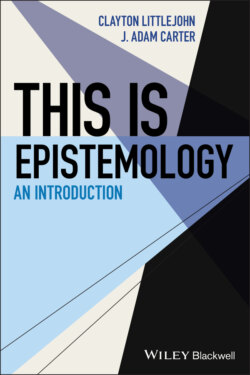Читать книгу This Is Epistemology - J. Adam Carter - Страница 17
1.2 Infinitism and the Regress Problem
Оглавление1.22 Infinitism tells us that a belief is justified iff it is appropriately supported by an infinite collection of non‐repeating justifiers (i.e. justified beliefs or available supporting reasons). This is tantamount to accepting the Supporting Justified Belief Rule and taking it to its logical conclusion without ceding to the skeptic.
1.23 For obvious reasons, infinitism looks like quite a difficult pill to swallow. The elephant in the room here is that the collection of non‐repeating justifiers must be infinite. Should a view that is premised upon such a seemingly overwhelming suggestion be dismissed out of hand? Perhaps not. As proponents of infinitism John Turri and Peter Klein have suggested, the principal reason that we should accept infinitism is that whatever problems infinitism faces, the problems that face the only two alternatives are worse.13 They state this overarching “process of elimination argument” for (non‐skeptical14) infinitism as follows:
Master Argument for Epistemic Infinitism
P1 (Premise 1). There are three possible, non‐skeptical solutions to the regress problem: foundationalism, coherentism, and infinitism.
P2. There are insurmountable difficulties foundationalism and coherentism.
P3. Infinitism faces no insurmountable difficulties.
P4. Not having insurmountable difficulties is better than not.
C (Conclusion). Therefore, infinitism is the best non‐skeptical solution to the regress problem.15
P1 is widely taken for granted by all parties to the dispute, and P4 is likewise uncontentious.16 P2 and P3 are where the action lies. Whether P2 is true requires a careful engagement with foundationalism and coherentism (which we will turn to in more detail later in this chapter). In abridged form, though, the crux of the infinitist's defense of (2) goes as follows: our beliefs cannot be justified by some finite set of justifiers (as per foundationalism and coherentism), because all such sets will either involve (i) a belief that's not supported by further beliefs or (ii) circles of justification. If the former, the inferential beliefs cannot be justified because the non‐inferential beliefs that they depend on seem arbitrary. If the latter, the beliefs cannot be justified because the circles of justification cannot confer justification upon these beliefs.
1.24 Let's suppose for a minute that P2 is correct, and that the above‐noted (and perhaps related) difficulties to foundationalism and coherentism really are insurmountable as the infinitist insists. Even if that were so, the Master Argument for Epistemic Infinitism establishes C only if P3 can be established – viz. only if the problems that face infinitism are not equally insurmountable. Before we turn to examine the problems that face foundationalism and coherentism, let's first see how well infinitism holds up to the objections it faces.
